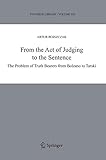From the Act of Judging to the Sentence : The Problem of Truth Bearers from Bolzano to Tarski / by Artur Rojszczak ; edited by Jan Wolenski.
Tipo de material: TextoSeries Synthese Library, Studies in Epistemology, Logic, Methodology, and Philosophy of Science ; 328Editor: Dordrecht : Springer Netherlands, 2005Descripción: xv, 240 páginas recurso en líneaTipo de contenido:
TextoSeries Synthese Library, Studies in Epistemology, Logic, Methodology, and Philosophy of Science ; 328Editor: Dordrecht : Springer Netherlands, 2005Descripción: xv, 240 páginas recurso en líneaTipo de contenido: - texto
- computadora
- recurso en línea
- 9781402033971
- B1-5802
Springer eBooks
Introduction: Alfred Tarski’s Philosophical Background in the Context of His 1933 Definition of Truth -- The Notion of the Truth Bearer -- Descriptive Psychology: The Theory of Judgement as the Theory of Cognition and Knowledge -- Judgement, Psychology, and Language -- The Ontology of Judgement -- Reism -- The Objectivity of Truth -- Ontologism, Abstract Objects and Nominalism -- Brentanism and the Background of the Semantics of the Lvov-Warsaw School -- Judgment, Belief, and Sentences: Remarks on the Truth Bearer in the Lvov-Warsaw School -- Final Comments.
This book offers a detailed study of the truth-bearers problem, that is, the question of which category of items the predicates ‘true’ and ‘false’ are predicated. The book has two dimensions: historical and systematic. Both focus around Tarski’s semantic theory of truth. The author locates Tarski’s ideas in a broad context of Austrian philosophy, in particular, Brentano’s tradition. However, Bolzano and phenomenology (Husserl and Reinach) are also taken into account. The historical perspective is completed by showing how Tarski was rooted in Polish philosophical tradition originated with Twardowski and his version of Brentanism. The historical considerations are the basis for showing how the idea of truth-bearers as acts of judging was transformed into the theory of truth-bearers as sentences. In particular, the author analyses the way to nominalism in Polish philosophy, culminating in Lesniewski, Kotarbinski and Tarski. This book is indispensable for everybody interested in the evolution of Austrian philosophy from descriptive psychology to semantics. It is also a fundamental contribution toward a deeper understanding of the philosophical background of Tarski’s theory of truth.
Para consulta fuera de la UANL se requiere clave de acceso remoto.


